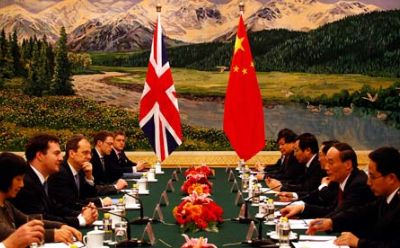China's economic success challenges US and British failed market consensusHow the tables are turned. As Britain tips back towards recession and the eurozone hovers on the brink of implosion, George Osborne hurried off to the former British colony of Hong Kong this week to drum up business for the City as a future trading centre for the Chinese currency. On Tuesday he was in Beijing to lobby China to do what neither the British private nor public sector is prepared to do – invest in crisis-ridden Britain. The chancellor's quest follows the European Union's fruitless attempt to convince China to use some of its colossal reserves to back the eurozone's bailout fund. And given the relative performances of the European, US and Chinese economies in recent years, it's not hard to see why western politicians now feel the need for Chinese support. It's a commonplace that China is the world's emerging economic giant. After 30 years averaging more than 9% annual growth, China is now the world's second largest economy and its fastest-growing market. Hundreds of millions of Chinese have been taken out of poverty, as its international share of manufacturing has risen from 2% to 20% in 20 years. But it has been the slump in Europe, the US and Japan that has most dramatically underlined the yawning gap in performance between the world's long-established economic powers and China. In the four years from 2007 to 2011, US national income increased by less than 0.6% (the figure is still being revised down), the EU shrank by 0.3% and Japan declined by 5.2%. In the same period, despite the decline in export markets in those economies, China grew by more than 42%. But there is a deep reluctance in the austerity-afflicted western world to consider the reasons for such an astonishing gap. Europe is already heading ever deeper into the second phase of the crisis that erupted in 2007-8, now centred on the eurozone. When the credit agency S&P downgraded nine states' creditworthiness and the eurozone's own bailout fund, warning that "fiscal austerity alone risks becoming self-defeating", Angela Merkel's response was to press for the adoption of even tighter austerity. It is a recipe for economic disaster. Meanwhile, western analysts are predicting that China is heading in the same direction – as they have consistently and wrongly done for the past decade, but especially since the crash of 2008. The latest predictions of a "hard landing" for China focus on inflationary pressure, a legacy of bad bank loans, an overheated housing market, and the impact of stagnation or worse in Europe and the US. Maybe the pessimists will be proved right at last, but there are powerful reasons to suggest otherwise. Chinese growth for 2011 was 9.2%, compared with forecasts for Britain of around 1%. It's expected to drop back this year to between 7% and 8% – the kind of crisis to dream for. Last year's inflation is cooling off, as is the property bubble which, unlike in the US and Britain, was funded by savings rather than borrowing. As the Shanghai-based British economist John Ross argues, China has a strong record of absorbing bad loans in the wake of the 1997 Asian debt crisis, and is cushioned from the collapse in western demand by the fact that most of its trade is with the developing world. But crucially – unlike Britain, the US and the stricken eurozone economies – China has a modest budget deficit of around 2%. Which points to the central reason why China was able to ride out the global crisis of 2007-8 with such dramatic success. China's response was to launch the biggest stimulus programme in the world, investing heavily in infrastructure. But instead of doing it through deficit spending and printing money, the Chinese government was able to use its ownership and control of the banks and large state companies to increase lending and investment. Which is why China has grown by 10% a year since the crash, while the west and Japan have shrunk or stagnated. China has travelled a vast distance from the socialised economy of the Maoist period and has a huge private sector and large-scale foreign investment. But its hybrid economic model continues to be based around a publicly owned core of banks and corporations. So while in Europe and the US governments rely on indirect (and so far entirely ineffective) mechanisms to reverse the collapse of private investment at the heart of the crisis – and private banks and corporations hoard bailout cash – China has the leverage directly to boost investment, jobs and incomes. And that state-owned core has been central to the country's extraordinary growth over the past three decades. Of course that advance has also been based around the largest migration of workers in human history. And the costs of its economic rise have been massive: from rampant corruption and exploitation of low-wage labour to environmental degradation, decline in health and education provision, an explosion of inequality and serious restrictions on civil rights. Strikes and rural upheavals across China – as well as political shifts – are now challenging and having their impact on those failures. But China's authoritarian system can also lead people elsewhere to ignore some powerful lessons about its economic experience. And one of those is that what used to be celebrated across the political mainstream in Britain and Europe as a "mixed economy" – along with long-discarded levers such as capital controls – can deliver results that a privatised, deregulated economy is utterly unable to do. There's no sense in which the evolving Chinese economic model could or should be transplanted to Britain or Europe. And having long ago sold off public stakes across the economy, most European states don't have anything like the financial or industrial leverage that China does to drive economic growth. But it would also be obtuse not to recognise that a private-sector and market failure is at the heart of the current crisis; or to reconsider the role that new forms of public ownership could play in a modern economy in the light of China's experience; or to refuse to use publicly owned institutions that do exist, such as Britain's part state-owned banks, to forge a way out of the crisis. China's success represents a global opportunity, as George Osborne has grasped. But it should also be a challenge to a failed and discredited economic consensus. Twitter: @SeumasMilne |
ADVERTISEMENT
NEWS MAP
 Beijing on the map
Beijing on the map
TOP NEWS
ADVERTISEMENT
|




